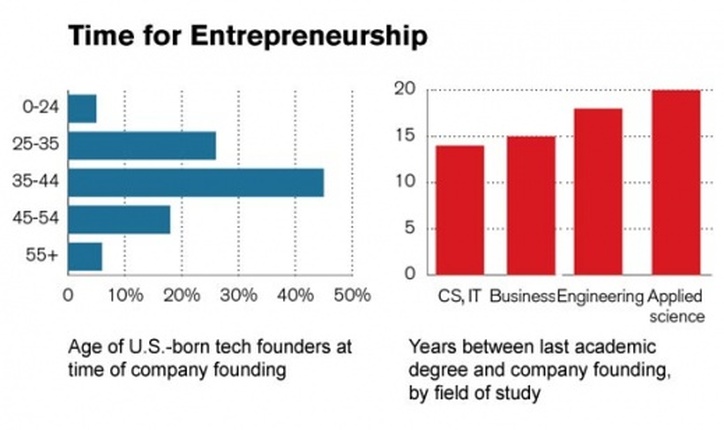Venture capitalists in Silicon Valley prefer to fund the young, the next Mark Zuckerberg. Why? The common mantra is that if you are over 35, you are too old to innovate.
To a degree, the cult Silicon Valley has built around young people makes sense—particularly in the Internet and mobile technology. The young have a huge advantage because they aren’t encumbered by the past. Older technology workers are experts in building and maintaining systems in old computer languages and architectures. They make much bigger salaries. Why should employers pay $150,000 for a worker with 20 years of irrelevant experience when they can hire a fresh college graduate for $60,000? After all, the graduate will bring in new ideas and doesn’t have to go home early to a family.
A key ingredient in innovation is the ability to challenge authority and break rules, a passion the Internet is unlocking among a new generation of youth worldwide.
The young understand the limits of the Web world, but they don’t know their own limits. It’s proving to be a powerful combination. Since they don’t know what isn’t possible, the Zuckerbergs can come up with new solutions to old problems. That is why they lead the charge in starting innovative mobile and Web companies.
When you meet entrepreneurs in India, Ireland, Brazil, and other parts of the world, you find many of the same dynamics at play. The young have the outrageous ideas, but its older people who achieve business success. In all these countries, youth entrepreneurship is on the rise.
But understanding diverse technologies isn’t the domain of the young. Though college dropouts may know all about social media, it is very unlikely that they understand the intricacies of nanotechnology and artificial intelligence as well as their elders do. These are complex technologies that require not only a strong education but also the ability to work across domains and collaborate with intellectual peers in different disciplines of science and engineering.
The reality is that there is no age requirement for innovation. The young and old can both innovate. The young dominate new-era software development, and software will be a key driving force in the convergence of other technologies that are expanding exponentially. So we badly need our young. And we need our older entrepreneurs to develop cross-disciplinary solutions that solve the grand challenges of humanity.
#TechReview #MIT #VivekWadhwa #InnovationResearch
To a degree, the cult Silicon Valley has built around young people makes sense—particularly in the Internet and mobile technology. The young have a huge advantage because they aren’t encumbered by the past. Older technology workers are experts in building and maintaining systems in old computer languages and architectures. They make much bigger salaries. Why should employers pay $150,000 for a worker with 20 years of irrelevant experience when they can hire a fresh college graduate for $60,000? After all, the graduate will bring in new ideas and doesn’t have to go home early to a family.
A key ingredient in innovation is the ability to challenge authority and break rules, a passion the Internet is unlocking among a new generation of youth worldwide.
The young understand the limits of the Web world, but they don’t know their own limits. It’s proving to be a powerful combination. Since they don’t know what isn’t possible, the Zuckerbergs can come up with new solutions to old problems. That is why they lead the charge in starting innovative mobile and Web companies.
When you meet entrepreneurs in India, Ireland, Brazil, and other parts of the world, you find many of the same dynamics at play. The young have the outrageous ideas, but its older people who achieve business success. In all these countries, youth entrepreneurship is on the rise.
But understanding diverse technologies isn’t the domain of the young. Though college dropouts may know all about social media, it is very unlikely that they understand the intricacies of nanotechnology and artificial intelligence as well as their elders do. These are complex technologies that require not only a strong education but also the ability to work across domains and collaborate with intellectual peers in different disciplines of science and engineering.
The reality is that there is no age requirement for innovation. The young and old can both innovate. The young dominate new-era software development, and software will be a key driving force in the convergence of other technologies that are expanding exponentially. So we badly need our young. And we need our older entrepreneurs to develop cross-disciplinary solutions that solve the grand challenges of humanity.
#TechReview #MIT #VivekWadhwa #InnovationResearch


 RSS Feed
RSS Feed
